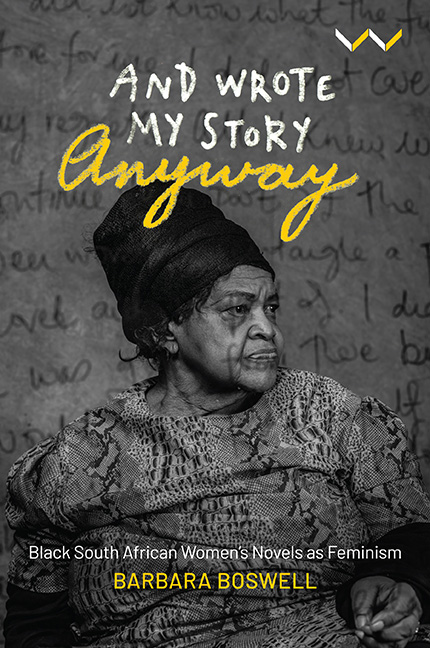Book contents
- Frontmatter
- Dedication
- Contents
- Acknowledgements
- Author's Preface
- Acronyms
- Introduction: ‘And Wrote My Story Anyway’: Black South African Women's Novels as Feminism
- 1 Writing as Activism: A History of Black South African Women's Writing
- 2 Rewriting the Apartheid Nation: Miriam Tlali and Lauretta Ngcobo
- 3 Dissenting Daughters: Girlhood and Nation in the Fiction of Farida Karodia and Agnes Sam
- 4 Interrogating ‘Truth’ in the Post-Apartheid Nation: Zoë Wicomb and Sindiwe Magona
- 5 Making Personhood: Remaking History in Yvette Christiansë and Rayda Jacobs's Neo-Slave Narratives
- 6 Black Women Writing ‘New’ South African Masculinities: Kagiso Lesego Molope and Zukiswa Wanner
- Conclusion: Towards a Black South African Feminist Criticism
- Select Bibliography
- Index
2 - Rewriting the Apartheid Nation: Miriam Tlali and Lauretta Ngcobo
Published online by Cambridge University Press: 15 June 2021
- Frontmatter
- Dedication
- Contents
- Acknowledgements
- Author's Preface
- Acronyms
- Introduction: ‘And Wrote My Story Anyway’: Black South African Women's Novels as Feminism
- 1 Writing as Activism: A History of Black South African Women's Writing
- 2 Rewriting the Apartheid Nation: Miriam Tlali and Lauretta Ngcobo
- 3 Dissenting Daughters: Girlhood and Nation in the Fiction of Farida Karodia and Agnes Sam
- 4 Interrogating ‘Truth’ in the Post-Apartheid Nation: Zoë Wicomb and Sindiwe Magona
- 5 Making Personhood: Remaking History in Yvette Christiansë and Rayda Jacobs's Neo-Slave Narratives
- 6 Black Women Writing ‘New’ South African Masculinities: Kagiso Lesego Molope and Zukiswa Wanner
- Conclusion: Towards a Black South African Feminist Criticism
- Select Bibliography
- Index
Summary
Writing turns space into place.
Margaret Daymond et al.— Women Writing Africa: The Southern RegionBlack women's histories, lives, and spaces must be understood as enmeshing with traditional geographic arrangements in order to identify a different way of knowing and writing the social world and to expand how the production of space is achieved across terrains of domination.
Katherine McKittrick — Demonic Grounds:Black Women and the Cartographies of StruggleA poignant scene opens Lauretta Ngcobo's debut novel, Cross of Gold (1981). Sindisiwe Zikode, a mother, an anti-apartheid freedom fighter, and a former domestic worker, is on the run from the South African Police. When the reader first encounters her, Sindisiwe is stalking the border between Botswana and South Africa. Exiled in Botswana, Sindisiwe tries to facilitate the safe passage of her young sons from South Africa. The novel's opening pages make palpable the danger the family faces in its bid for freedom from a politically oppressive regime.
Early in the first chapter of the novel, Sindisiwe is shot by police from the South African side of the border. She secures a safe crossing for her sons, but unable to get to a hospital, dies an excruciating death under a searing southern African sky. Sindisiwe is buried in a shallow grave by strangers as her sons try to process the loss of a mother they hardly knew. She has, however, left some sort of legacy, one that her sons discover in a suitcase after her death: a long, lyrical letter, describing the change in her subjectivity from apolitical domestic worker to militant anti-apartheid activist. The letter describes, in great detail, Sindisiwe's transformation into a political subject. Its pages bear witness to the Sharpeville Massacre of 1960, which killed 69 peaceful black protestors in a township on the outskirts of Johannesburg. Determined to frame the political event from her own perspective as a black woman, Sindisiwe makes her standpoint clear in the opening sentences of her letter. ‘Whatever you know, it is not from me you got it’ (Cross of Gold, 20), she writes, providing a rationale for her letter writing.
- Type
- Chapter
- Information
- And Wrote My Story AnywayBlack South African Women's Novels as Feminism, pp. 59 - 88Publisher: Wits University PressPrint publication year: 2021



